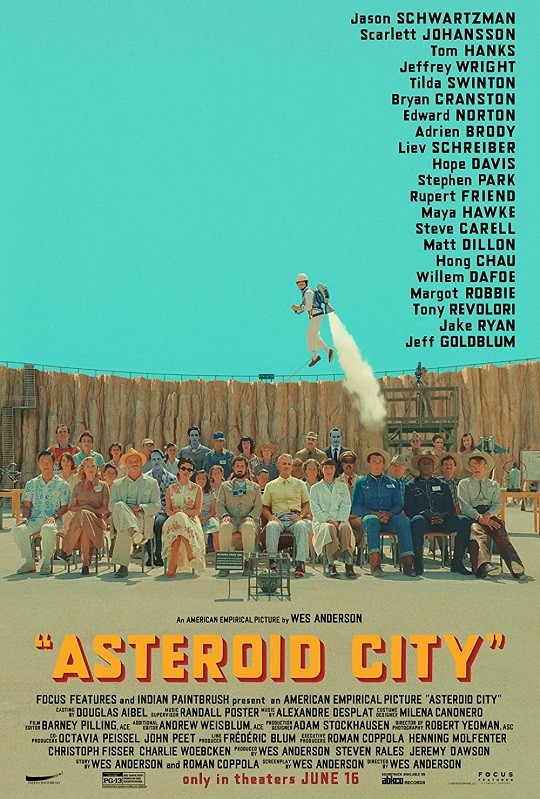Asteroid City(Movie Explained/Ending Explained)
Introduction
It is a Thursday and just a day away from the new weekend releases. But before that, I thought of squeezing in another one of those reviews of films that I have waited long enough to premiere on digital. With that, I finished watching the new English film Asteroid City which is directed by the aesthetic genius Wes Anderson. If you are familiar with his previous works then you would know that Anderson can be regarded as an absurdist filmmaker. The reason for the same is that his films have a weird sense of humour which may not appeal to everyone instantly.
I have often found myself taking a second helping of his films to truly get the aesthetic sense of what the point of the film was. It happened with The Grand Budapest Hotel and recently with The French Dispatch which were very different kinds of films with regard to its subject and storytelling. I expected a similar niche with respect to Asteroid City whose theatrical release was called off in India for some odd reason. The film did seem to be glitzy with an outburst of colours, and with a stellar cast at the helm of it, I was really curious on what Wes Anderson had to serve this time around. So then, does Asteroid City manage to impress, lets find out.
Story & Screenplay(Movie + Ending Explained)
Asteroid City follows the story of a play within a play wherein a group of people are quarantined at as astronomy convention after a weird turn of events. Now this is just the surface level of the story that explores so many concepts of a social satire along with a unique take of trauma that actors face even while performing. I shall try and explain a few in this section so make sure to have watched the film(or skip to the next section completely). The screenplay standing at just about a 100 odd minutes does make for a crisp watch but an absurd one as well wherein you may be left scratching your head on what the film is trying to say. It is easy to get distracted with the aesthetics while completely missing the point of the film. So, spoilers ahead as I shall try and put things to perspective!
The drama does open on a very unique note with three contrasting yet parallel stories unfolding at the same time. One follows a television special(shot in Black and White Academy Ratio) which is more like a documentary of the play which is being showcased, the second the actual multicolour play that is played over a certain period, and the third involves the pre and post production and the backstage activities that take place while the play is on.
In the play you are introduced to the protagonist named Augie who is suffering from depression following the loss of his wife. Everyone has their own ways of dealing with trauma and loss, and he deals with it by hiding it from his children who are unaware that their mother is no more. This is eerily similar to the mindset of the actor playing Augie named Jones who was romantically involved with Conrad, a legendary playright before the latter meets with his death. So trauma is the common thread between the two worlds while the actor who is undergoing depression has to enact a part about trauma in his play. This is the sentiiment which so many actors would be facing which is represented by a few unforeseen actions like Augie suddenly burning his hand or questioning the motive of the play with his director.
The proceedings are interesting and immersive in every sense of the word. The drama is also a bit of a political satire that questions the motive of the government who does impose a lockdown following an alien visit who disappears after taking the asteroid(which was symbolic of the name of the city). The military does take over by enforcing strict rules much to the dismay of the visitors of Asteroid City. This can also be equated to the pandemic times wherein people were thrashed and punished for venturing out of their homes(the motive wasn’t wrong but the actions could have been softer). The empathy did seem to be missing which did result in a backlash and chaos at the end of the play(particularly from the youth)!
The drama is divided in acts, further broken down into scenes. The trademark Anderson humour is prevalent throughout the film that is a niche in itself. You do need a little patience to absorb the undercurrents of the drama. Yet, the most interesting aspect of the drama was its final act which was probably Anderson at his weirdest best! In a scene, you see different actors attending a meeting with the late playright who wishes to write a scene with all actors asleep filled with dreams post the alien visit. While all actors demonstrate their slumber patterns, a few of them repeat the lines, ‘You can’t wake up if you don’t fall asleep’. This is open to interpretation but Anderson does allow the viewers suffering from depression to be immersed in art forms like plays or movies, almost like escapism. The more you dwell in art(signifying sleep), you see changes in your perspective and mindset(almost like waking up fresh after a deep sleep). Overall, the screenplay is niche and may not be understood by everyone. Yet, it is poignant beneath the layers of colours and glamour that truly captures the soul of the film!
Dialogues, Music & Direction
The dialogues are playful representing the numbness of several characters. The music blends perfectly with the surroundings, the BGM is top notch as well. The cinematography like in all Wes Anderson films is top notch with the right contrast of colour aesthetics that capture the mood of the drama. For instance, the outwardly colourful proceedings of the play are in stark contrast of the pale and gloomy reality(represented through black and white shots signifying trauma). There is so much to love here in what is such a technically superior product. The editing is top notch and crisp as well. Director Wes Anderson often has a unique take on themes resulting in some of the most absurd works of art. That bar has gone up a few notches with this very abstract drama that may not cater to everyone. Yet, if you are willing to dig beneath the surface, the hidden feelings would grapple you like never before. The aesthetic master scores once again here as far as I was concerned.
Performances
The performances are stellar by an equally stellar cast. Willem Dafoe as Satlzburg, Margot Robbie as the wife, Edward Norton as Conrad and Adrien Brody as Schubert, all have their moments to shine. Bryan Cranston as The Host, Tilda Swinton as Dr Hickenlooper and Tom Hanks as Stanley are fabulous to watch. Jake Ryan as Woodrow does a splendid job as does Maya Hawke as June. Scarlett Johansson as Midge is wonderfully restrained and brilliant with her dual roles. Jason Schwartzma as Augie is wonderful to watch and he showcases trauma in a rather different manner. All other actors dona wonderful job as well.
Conclusion
Asteroid City is an aesthetically abstract drama with undertones of trauma that might be a niche but makes for a brilliant watch!




